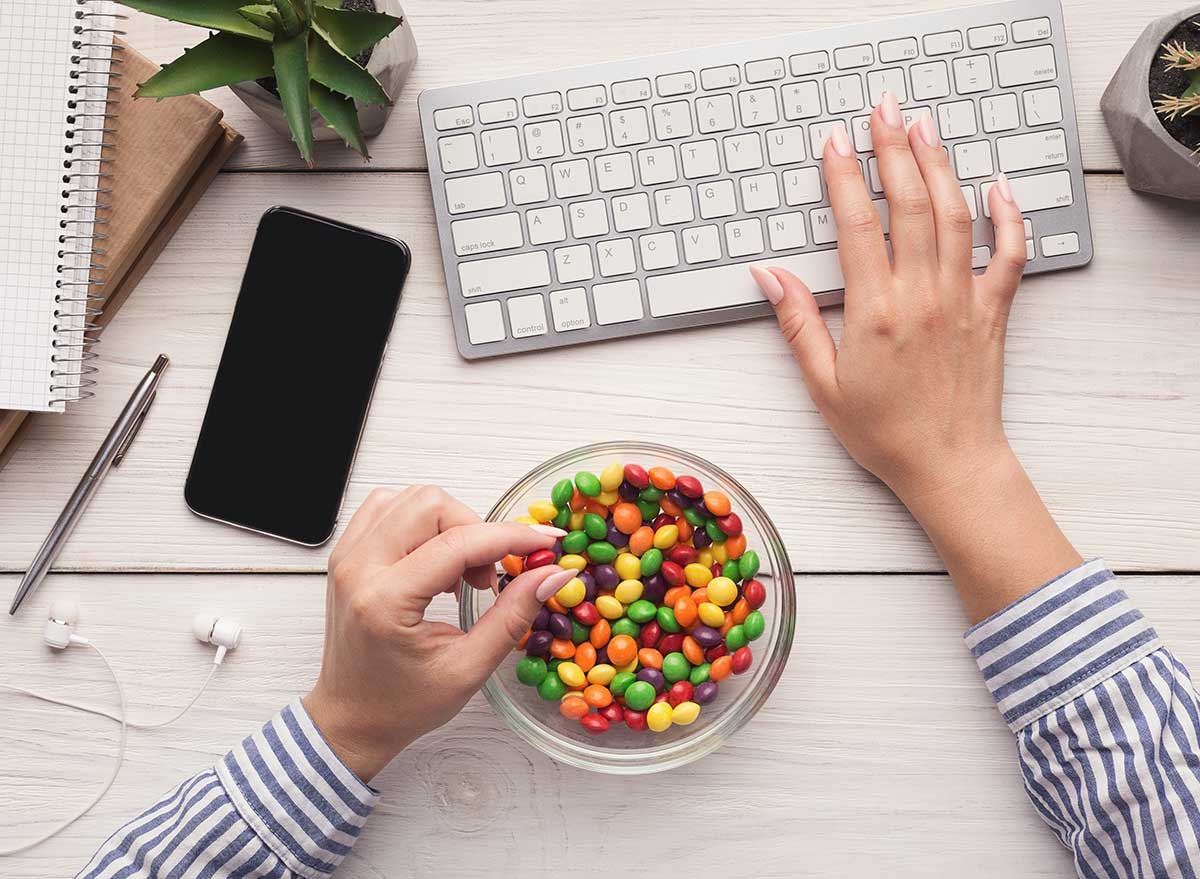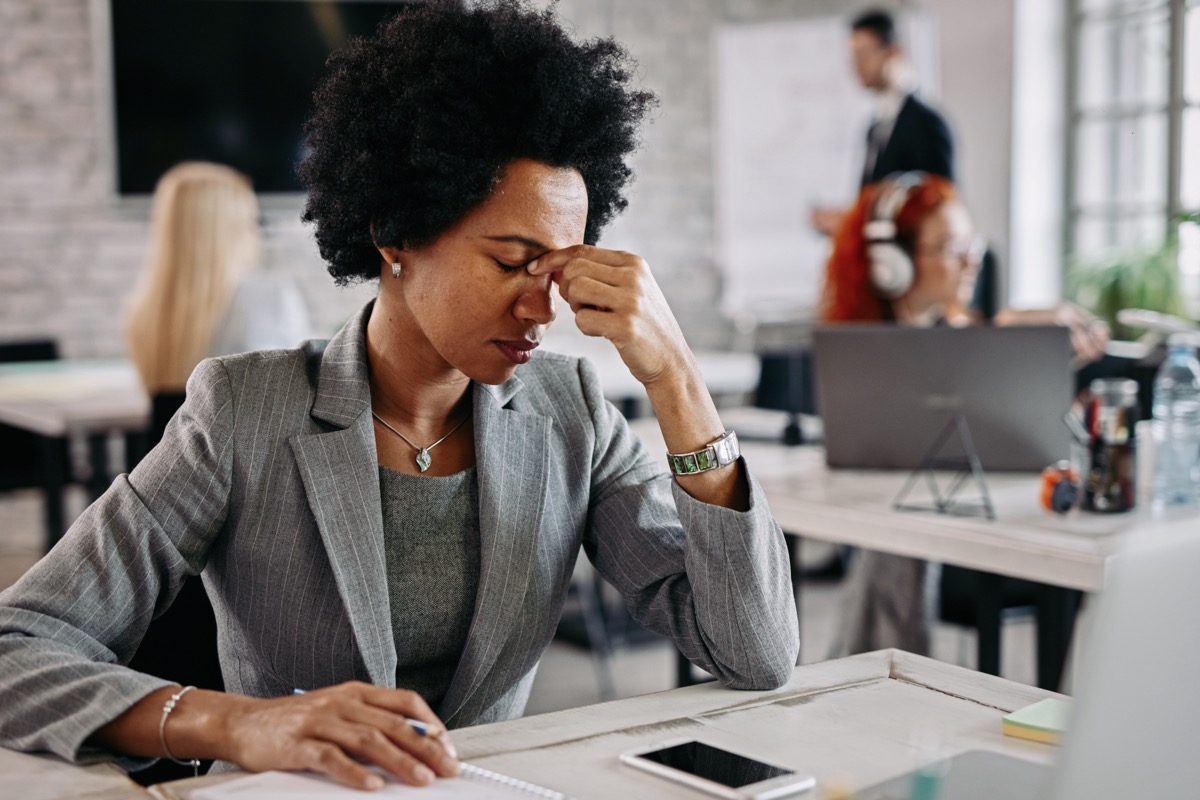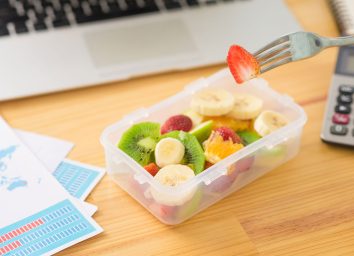Surprising Side Effects of Eating At Your Desk, Says Dietitian

If you work a desk job, whether in the comforts of home or at some type of office, many of us are guilty of one thing: Not taking the time to break for lunch. Neglecting to give yourself time to eat a meal without trying to pick away at a pressing to-do list can negatively affect your well-being.
“I would encourage stepping away for as long as you are able,” says Samantha Cochrane, RDN, LD a registered dietitian at The Ohio State University Wexner Medical Center. “The time needed for healthy digestion is different from person to person. In most workplaces today, this is between 30 to 60 minutes. With 30 minutes, I would recommend using 15-20 minutes to eat your meal mindfully and slowly, leaving the additional time to rest and digest.”
If you happen to have a full hour, Cochrane suggests utilizing that extra 30 minutes to sneak in some intentional movement such as walking or finding a quiet space to meditate. Now, here are four side effects that could occur from eating at your work desk.
You may east faster than usual.

As Cochrane points out, when we eat at our desks, we’re often overwhelmed with distractions, which can cause us to miss cues that indicate feelings of fullness.
“From new emails ‘pinging’ in for review to overdue projects calling our names, it seems there is always something we could do while we eat,” she says.
While multitasking might make you feel productive, you sacrifice eating intuitively to the point where you may not even recognize when you feel satisfied.
“When distracted we tend to eat faster,” she says. “Eating faster can unintentionally result in eating more [due to] not being as in-tune to our hunger levels and reaching that overly-full and stuffed state.”
It also works the other way, too.
“If you don’t have enough food to get to that stuffed state, distracted eating or eating too quickly can also leave you feeling too empty and unsatisfied,” she adds. “Distracted eating can also take away the time to savor and enjoy the food that you eat. Why not take a break, sit back, and truly enjoy?”
You likely walk less.

“Especially in a time where many of us might work from home, lunch can be one of the only times of the day where we get away from our desks,” says Cochrane. “It may not seem like much but even the extra steps to and from the kitchen can add up and make an impact on your health.”
Don’t miss What a Daily Walking Habit Does to Your Body After 60, Says Science.
You’re more likely to reach for convenience foods.

If you’re not even allowing yourself the time to step away from your desk and enjoy a meal, you’re likely not giving yourself the time to prepare a nutritious meal either. In fact, you may be more apt to reach for unhealthy frozen meals or order fast food from Uber Eats.
“It could mean sitting down with a bag of chips and a sandwich versus portioning out and heating up the leftovers from last night’s dinner of smoked salmon and whole-grain pasta with a big side of roasted veggies,” says Cochrane. “Spending the time it takes to eat something that might require a little more preparation and concentration might [also] help in increasing the mix of nutrients you get at this meal.”
That’s not to say that all quick-to-make meals are bad for you, though. For example, you might quickly slice up some fresh veggies such as bell peppers and celery and grab some hummus for dipping. You may even put together a nut butter sandwich with whole-grain bread and a low-sugar fruit spread.
You may find that your stress levels increase.

Taking a break to eat not only helps you eat with intention, but it also helps you take your mind off of work.
“Working through lunch without a break may lead to increased stress, which can affect your overall health and well-being,” says Cochrane. “Taking the time to eat without distractions, [get up and] move, and nourish your body can help promote decreased stress [levels] and give you the time you need to feel refreshed to return to work.”
For more advice, be sure to check out 10 Common Diet Tips You Need to Stop Following Right Now.








